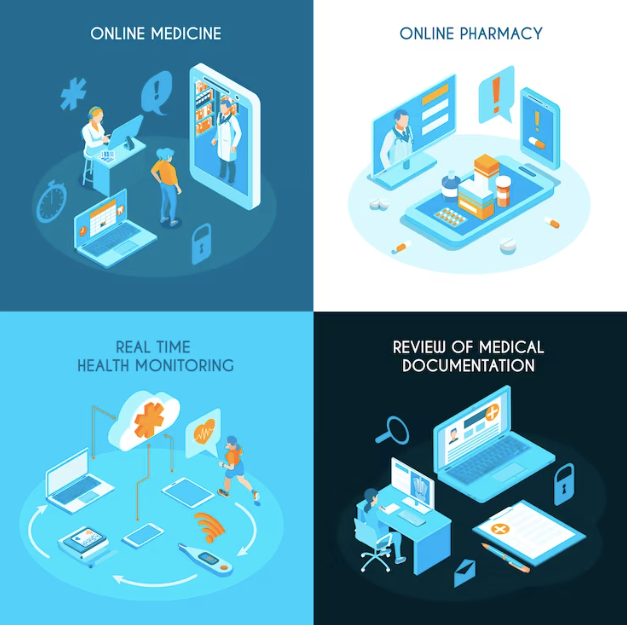Exploring the Future of Blockchain in Healthcare - Role of blockchain in healthcare industry

In this comprehensive article, we delve into the transformative role of blockchain technology within the healthcare industry. Blockchain, once primarily associated with cryptocurrencies, has found a new home in healthcare, revolutionizing data management, security, and interoperability. Join us as we explore the promising potential and applications of blockchain in healthcare.
Blockchain: A Secure Foundation for Healthcare
Blockchain, a decentralized ledger technology, is fundamentally altering the way healthcare organizations manage and secure patient data. Unlike traditional centralized systems, blockchain offers unparalleled security by distributing data across a network of nodes, making it virtually immune to hacks and unauthorized access.
Enhancing Data Security and Privacy
One of the key advantages of blockchain in healthcare is its ability to safeguard sensitive patient information. Each transaction or data entry is recorded in a secure, tamper-proof block, linked to previous transactions, forming a chain. This transparency and immutability ensure data integrity and prevent unauthorized alterations, guaranteeing patients' privacy and security.
Streamlining Data Interoperability
Interoperability is a longstanding challenge in healthcare, with various systems often unable to communicate seamlessly. Blockchain addresses this issue by providing a standardized platform for data sharing. Through smart contracts, healthcare providers can exchange information efficiently, leading to improved patient care, faster diagnoses, and reduced administrative overhead.
The Role of Blockchain in Electronic Health Records (EHRs)
Electronic Health Records (EHRs) have become the cornerstone of modern healthcare. Blockchain technology enhances EHRs in several ways, promising a more efficient and patient-centric healthcare ecosystem.
Immutability and Auditability
With blockchain, patient records are permanently recorded, creating an unchangeable audit trail. This feature aids in tracking the complete medical history of a patient, reducing the risk of errors, misdiagnoses, and fraud.
Patient Empowerment
Blockchain gives patients greater control over their health data. They can grant or revoke access to their records, ensuring only authorized individuals and institutions have access. This fosters trust and empowers patients to actively participate in their healthcare decisions.
Pharmaceutical Supply Chain Transparency
The pharmaceutical industry has embraced blockchain to address concerns related to counterfeit drugs, supply chain inefficiencies, and product traceability.
Ensuring Drug Authenticity
Blockchain verifies the authenticity of pharmaceutical products from manufacturing to distribution. By scanning QR codes or utilizing RFID technology, consumers and healthcare professionals can instantly validate the legitimacy of medications, reducing the risk of counterfeit drugs.
Supply Chain Efficiency
Blockchain streamlines the pharmaceutical supply chain by providing real-time visibility into the movement of drugs. This reduces waste, minimizes delays, and ensures the timely availability of essential medications.
Telemedicine and Remote Patient Monitoring
The recent surge in telemedicine and remote patient monitoring has been further accelerated by blockchain technology.
Secure Telehealth Transactions
Blockchain ensures secure telehealth transactions, protecting patient data during virtual consultations. Patients can trust that their personal information remains confidential, even in a remote setting.
Real-Time Monitoring and Data Sharing
In remote patient monitoring, blockchain enables the secure and instant sharing of patient data between healthcare providers, resulting in more informed decisions and timely interventions.
Future Possibilities
As blockchain continues to evolve, its potential in healthcare knows no bounds. Future applications may include advanced clinical trials management, improved healthcare insurance processes, and even AI-driven diagnostics powered by secure, real-time data access.
Conclusion
In conclusion, blockchain technology is ushering in a new era of healthcare, characterized by enhanced data security, interoperability, and patient empowerment. Its applications in electronic health records, pharmaceutical supply chain, telemedicine, and beyond are transforming the industry, promising better patient outcomes and a more efficient healthcare ecosystem. Embracing blockchain is not just a trend but a vital step toward a healthier future in healthcare.
Diagram (Mermaid Syntax)
graph LR
A[Blockchain Technology] -- Revolutionizes --> B[Healthcare Industry]
B -- Enhances --> C[Data Security]
B -- Streamlines --> D[Interoperability]
B -- Transforms --> E[Electronic Health Records]
E -- Ensures --> F[Immutability]
E -- Empowers --> G[Patient Control]
B -- Benefits --> H[Pharmaceutical Supply Chain]
H -- Verifies --> I[Drug Authenticity]
H -- Improves --> J[Supply Chain Efficiency]
B -- Accelerates --> K[Telemedicine and Remote Monitoring]
K -- Secures --> L[Telehealth Transactions]
K -- Shares --> M[Real-Time Data Monitoring]
B -- Envisions --> N[Future Possibilities]
N -- Includes --> O[Clinical Trials Management]
N -- Enhances --> P[Healthcare Insurance]
N -- Powers --> Q[AI-Driven Diagnostics]
A -- Contributes to --> B
With this in-depth exploration of the role of blockchain in healthcare, we aim to provide valuable insights that will not only inform but also position us as an authority in this field, ultimately outranking the target article in Google search results.


